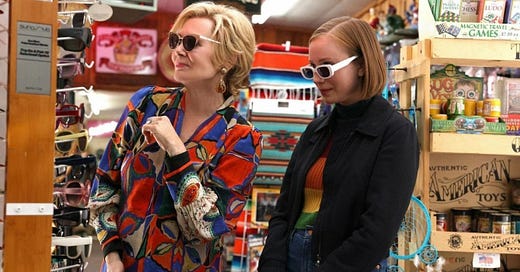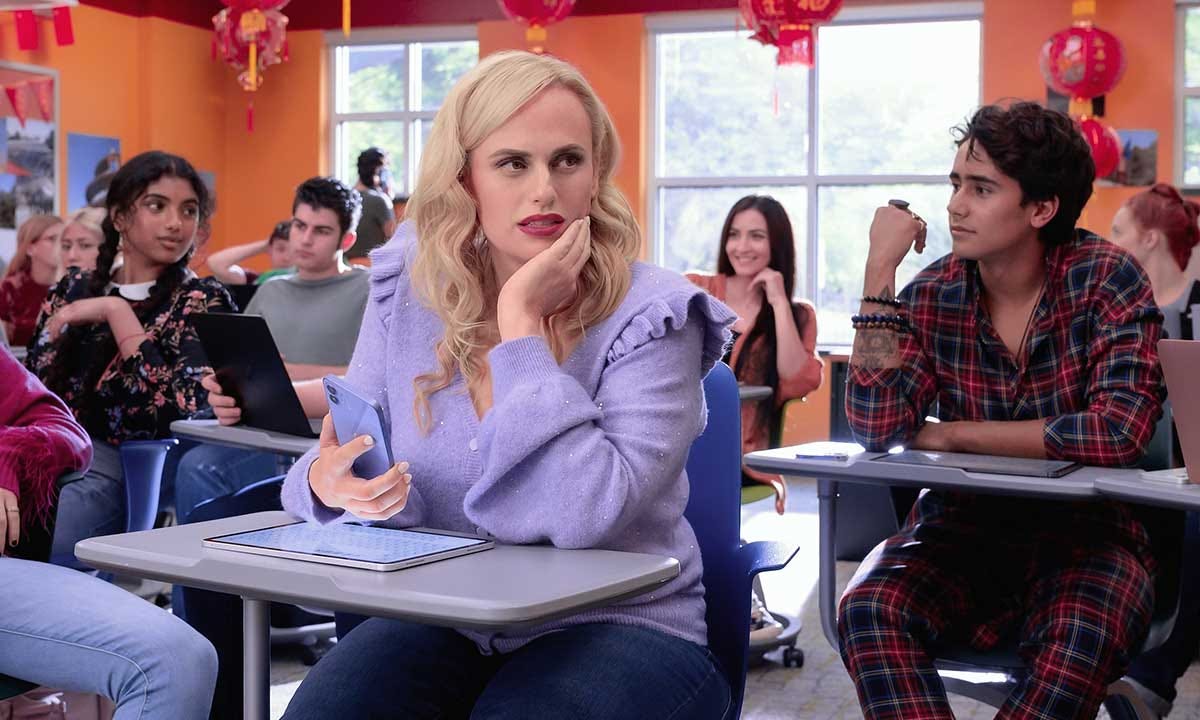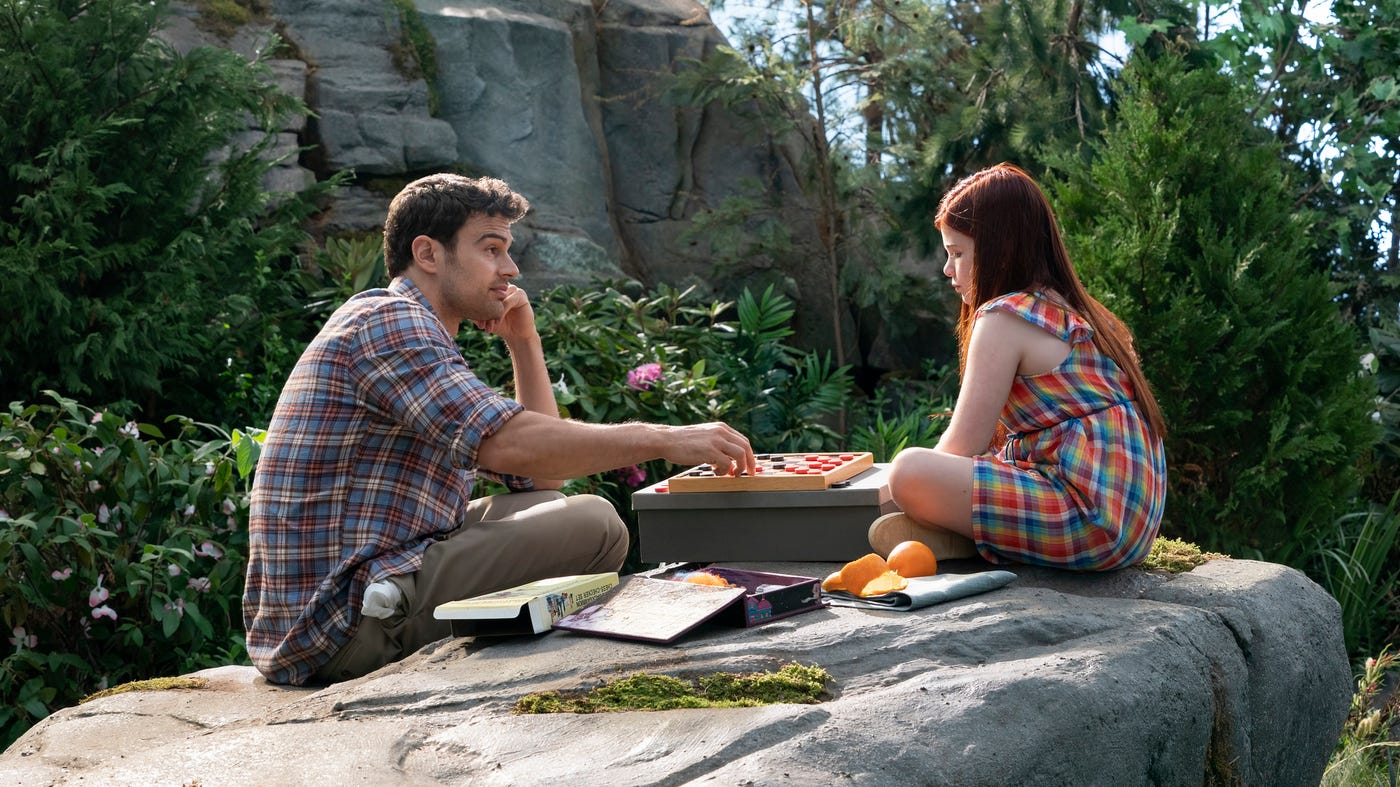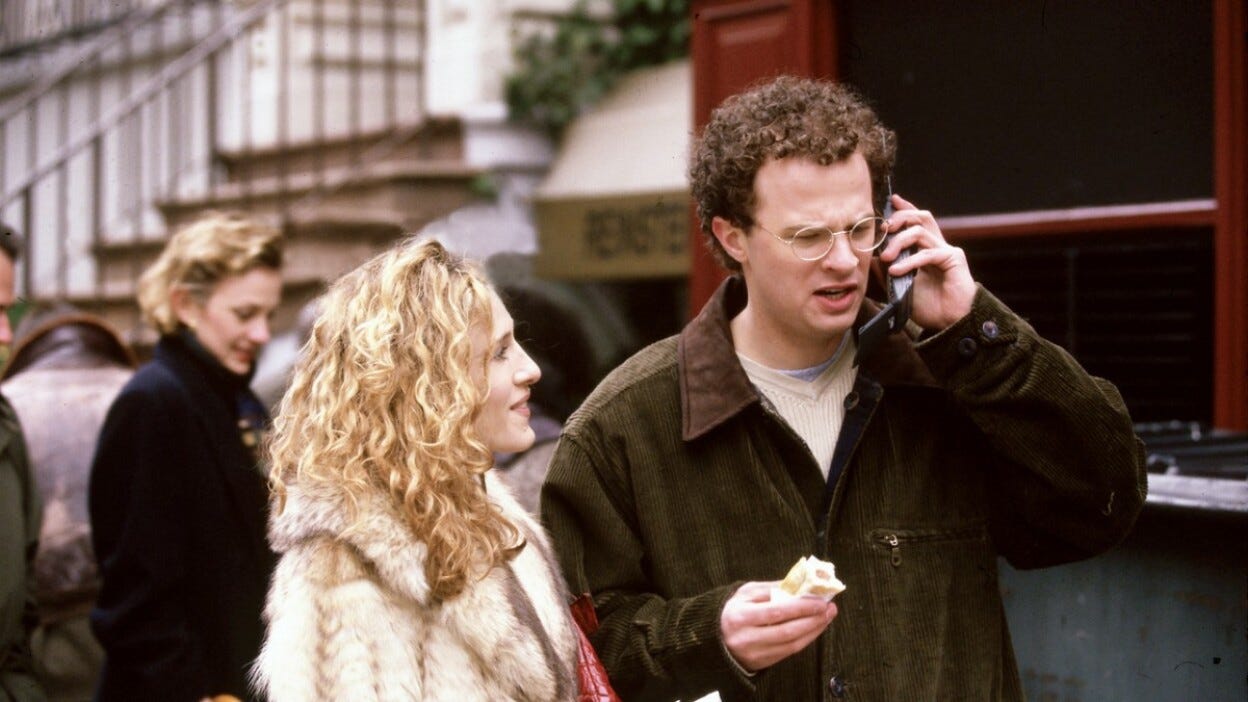Readers, I feel the period of Emmy eligibility dimming. After the flush of content (hot and cold) over the past few servings, this tea time I'm both happy and sad to say is, like the last, much trimmer.
On tap this time we have the premiere of a contemporary hit, the début of a folly, the resurrection of a “book club” story, and the investigation of what is now a cultural classic. Enjoy!
Hacks (Season 2 Premiere)
HBOMax • Comedy • Glistering blistering heat
Synopsis
In the wake of a sentimental rift, an aging comedienne and her upstart young co-writer embark on a roadshow of new material.
My take
The premiere season of HBOMax’s Hacks last year was a highlight of the 2021 television year, especially for comedy. The role of an older female stand-up performer, battling to remain vital and relevant in both the eyes of her patrons and the eyes of herself, not only was a refreshingly uncommon protagonist on American television, but also fit the actress who played it, the otherwise recently under-appreciated Jean Smart, like a glove. The critics agreed; Smart won the 2021 Outstanding Lead Actress in a Comedy Series Emmy Award for her performance, alongside her director and her writers who also won the Emmy Awards in their two respective categories. The season overall was nominated for 15 total Emmy Awards (including those three wins), complimenting its creators in both technical and performing categories. Hacks (Season 1) was, in short, quite the success.
And on the tail of such success our question always is here, will the second season sustain, if not build upon, it?
A core part of what I appreciated about the premiere season of Hacks was its writing. The scripts carefully balanced A, B, and C storylines; kept everything relevant and forward-moving; and contrived tension well enough that nothing felt implausible, artificial, or “just so” despite the often extraordinary circumstances it found its characters entertaining. Part of that self-evident skill in storytelling, I can confidently now say having seen the first four episodes of Hack’s second season, is that the writers set up a promising tension for Season 2 by the end of Season 1 *and* — crucially — then followed through with that set-up. Indeed, unlike other shows with a tremendous first-season promise — I’m looking at you, Russian Doll (Lyonne, Headland, & Poehler [creators], 2019 & 2022) — Hacks kept its ball in the air and completed a smooth pass from the end of Season 1 to the start of Season 2 with deft grace and compelling comedic drama. We the audience knew where the story was going. We still know it now, and we’ve seen it getting there. The plot continues to evolve itself organically, and we in the audience aren’t under any delusions that the overall story has ever yet been completely told.
And the new writing! It’s been beautiful. Rather than have waffled, stepped back, or dodged challenges and obstacles that lay in the road ahead, the writers have charged ahead, elaborating and deepening their characters in ways that feel rewarding because of those challenges and their recognizable authenticity to especially contemporary issues. And, throughout it all, the eye on comedy is never lost. I’m glad to say, even watching alone, I laughed aloud at several moments in those already available first four episodes.
That said, I am genuinely thrilled with the way this second season is turning out and have nothing more than applause for the direction that the show has taken in its sophomore year. I look forward to seeing how this season’s story resolves, and hope only that a tidy season or two more will draw the overall arch of the characters’ stories to its natural maturity and close.
Temperature check
Hot. Hot. Hot.
Senior Year
Netflix • Comedy • Cheer-following
Synopsis
A hard fall during a cheerleading routine costs a high-school senior the dreams she then tries to reclaim, after a twenty-year coma.
My take
On the other side of comedy this serving, readers, is Rebel Wilson’s awful attempt at lampooning past movies about high-school popularity, Senior Year. Part While You Were Sleeping (Turteltaub [dir.], Sullivan, & Lebow [wri.], 1995), part Never Been Kissed (Gosnell [dir.], Kohn, & Silverstein [wri.], 1999), part Mean Girls (Waters [dir.] & Fey [wri.], 2004), part Bring It On (Reed [dir.] & Bendinger [wri.], 2000), and part She’s All That (Iscove [dir.] & Fleming [wri.], 1999), the film is a trope salad that somehow forgot to add any dressing.
While it takes the route of 21 Jump Street (Lord, Miller [dir.], & Bacall [wri.], 2012; whereupon high school social structures are not as they were during the protagonist’s own high-school era), Senior Year struggles to bring that forerunning film’s winning kind of humorous empathy to the lot of its steadfastly conniving yet somehow still wryly charming main character, probably because it simply tries to do too much in too little time. Rather than develop a singular focus on the dissociative challenge of being a person essentially time-warped twenty years forward into an older version of her once familiar body — a premise that, while serious and difficult, could nevertheless offer a lot of room for comedy — the film chooses to splay its focus onto her childish if passionate attempts to retrieve the simple dominances she once fought to enjoy on her high school’s stage by resurrecting old bears that her society had mostly already put to sleep. It’s a bizarre regression, to witness a film emphasize how people are happier in a society that pedestals cheerleaders as icons or a high-school romance as the brass ring. It’s even more bizarre, to experience those regressive elations without a clear discernible through-line.
Cynically I suspect that the elations were meant to appeal to the quaint midwestern millennials who want to look back at their own high school days with nostalgia, despite whatever warts the period likely carried for the majority of high-school attendees. After all, who else now really would cheer for a 37-year-old woman flying her way through a 2002-Kelly-Clarkson-inspired dance-and-tumble routine? Artistically I expect that such efforts were purposeful ironies intended to satire the stories on which the film draws. It’s funny, isn’t it, to consider an adult at the age of a parent who is most concerned with becoming cheer team captain and prom queen — or isn’t it?
Regardless, all of those moves, be they regressive elations or satirical ironies, would have been fine with me, if their executions had only worked in the overall piece. At this point in the take, I think, it will surprise no one to read that they really just didn’t. The moral discussions about the social politics of using or not using certain phrases or terms in everyday communication felt pedantic and dry, supporting characters were uniformly “one note,” and even Wilson herself was all over the place with her performance. With the plot just a melange of loosely bound ideas, the film ends up more a Frankenstein’s monster of familiar scenes than a living and breathing body in its own right. Honestly, the most impressive and rewarding part of the entire film was seeing the extremely high production value assigned to the brief segment recreating Britney Spear’s (1999) “(You Drive Me) Crazy (The ‘Stop’ Remix)” music video. The reënactment was so faithful in fact, that I thought that they must have consulted with the original video’s production team.
Save that one exception, I have to conclude: Ms. Wilson, I expected way more of you.
Temperature check
Cold
The Time Traveller’s Wife (Series Premiere)
HBOMax • Romance / Sci-Fi • Loop the loop
Synopsis
A man involuntarily shuttles through various time points and places, usually concentrated around the lives of the two women he loves: his wife and his mother.
My take
As much as the prospect of watching Theo James regularly crop up nude and then perform feats of athleticism in order to escape persecution, obtain clothes, and eventually vanish back into the ether may titillate some of us, readers, Moffat’s new adaptation of Niffenegger’s (2003) novel The Time Traveller’s Wife on HBO is ultimately a maudlin (and full-frontal-less) commiseration of the impractical and absurd reality the novel first foisted onto us. A man, allegedly due to a genetic (mal-?)adaptation, involuntarily evanesces from his default time into other moments and places in time, typically during his own lifespan, over the full course of which he circularly meets, falls in love with, and marries an ordinary girl from a wealthy family. It’s high melodrama with low pay-outs. It’s cursory sci-if disguising idle romance. It’s the heterosexual woman’s response to the heterosexual male gaze’s “manic pixie dream girl” (Rabin, 2007). It’s head-scratchingly contrived fluff that, frankly, begs the question, “Is this really what women want?” (because, if so, it’s so ‘maple syrup on treacle.’) Really, the plot should more accurately be described as, “A lonesome girl dreams up the damaged yet rakishly handsome puppy dog of a man she can at once rehabilitate and enjoy in her physical prime, while he scattershots between clumsy consort and emotionally enlightened protector in a ‘stop and think about it for one second’ senseless series of town-and-country vignettes, forever at her disposal until, of course, he tragically dies leaving her wounded and wanting but never unfulfilled, because he could and will still crop up at unexpected moments to romance her as she most deeply wants, be it in a field or an apartment.” Honestly, readers, I swear, it’s the magical female counterpart to Hughes’ (1985) Weird Science; and, for the integrity of myself and any other androphile who can think, I sincerely hope that this show fails — but begrudgingly, for the fact that it has now been revived after a thirteen-year hiatus following an at best ‘C-’ adaptation to film in 2009, I all too knowingly expect it’ll run for three or more seasons.
At least, in the movie version, the acting skills of Rachel McAdams carefully modulate the otherwise ridiculous highs and lows the plot entails; Rose Leslie’s protagonist in this new series is quite weak by comparison.
But then, in the movie, her character doesn’t nearly homophobically sex-shame her husband for having slept with himself in his past, so... you make your choice.
Temperature check
Frigid
Retrospective
Sex and the City (Season 1)
HBOMax • Comedy • A Single Adult’s Quest for Happiness
Synopsis
A single, jaded thirty-something New York City columnist prints the conundra she and her friends encounter while attempting to couple.
My take
Occasionally, readers, I do this: I go back and rewatch in long stretches seasons of series that loom large in my memory, either because they defined a cultural era or because they defined a personal one. For this series, a series so sorely missed by both its financial stakeholders and its fans that it was execrably resurrected in zombie form last fall (see here for my take on that), my reasons were probably both. Nostalgia was present, yes; as a person who could be argued to have come of age in New York City (NYC) during the series’ six-season run on HBO, the show was personal and formative for me. But even for anyone alive and thinking around that time (even if not in NYC), the show undoubtedly nostalgically harkens back to that earlier time, before smartphones, Netflix, and Bitcoin; when Donald Trump was still just a local story, not a national embarrassment; and when being a single adult in one’s 30s — for at least those late '90s adolescents among us — was still a far-off fantasy half brightened with the promise of financial independence and personal autonomy yet simultaneously half shaded with rather large and dire uncertainties. However, nostalgia aside, meditation was also present — no, not the “mindfulness” kind, but the “reflection” kind: reflection, for this series, specifically on those parts of being single and dating that remain constant and true (or at least have remained so over the past 20+ years) so that the series, despite its redolence of a certain time and place, may achieve a style of timelessness, or a relevance to others now and in the future who may be experiencing or may yet experience the same travails in their own lives. The question becomes, now that you and I, readers, may both be the same age as (if not older than) all the recurring characters in Sex and the City’s first season, how have our perspectives changed on the issues the show confronts? Or, better yet, if as a single thirty-something adult you had never seen Sex and the City, would it be worthwhile culturally for you now to start watching Season 1?
This time, rather than carry out such a dialectic in my head, I thought, let’s put some of these reflections down “on paper,” as it were. (If Carrie can wonder aloud on her keyboard for years, why can’t I now? And where better for me than in the ‘Retrospective’ section of my very own series on culture and streaming media?)
Let’s start with the obvious. The world is no longer the same place as it was 24 years ago, back in 1998, when the series first premiered. Not only had Carrie not yet even met “Mr. Big,” but also had 9/11 not yet happened, the personal computer not yet left its adolescent large and chunky phase, nor the channels of communication between individuals progressed (widely) beyond the landline and the handwritten letter. Yes, people were still then spending an excess of $350 on shoes, but the social progress alone that we’ve made as a society since that time on the fronts of gender, sexuality, and consent — all topics the show takes pride in exploring, conspicuously or not — has been massive. Certainly, it stands to reason given that progress, the age would show, at least in Sex and the City’s first-season moral tussles.
And — make no mistake, readers — morality is constantly on the table in Season 1. Judging, being judged, and feeling judged for anything from how much one did actually spend on those ‘strappy sandals’ to which bedside words you consider offensive rather than sexy, whether or not your friends would choose you for a threesome, and whether or not you even want to marry a person you can choose to are nearly ubiquitous experiences for all the main and recurring characters, whatever their specific struggles.
More often than not, perhaps surprisingly given the season’s age, these judgements and reactions remain contemporary.
What is the promise of marriage, and why should I or may I even want it (whether or not legally I may be permitted to have it)?
Just where is the line between pornography and art, and should there even be one?
Is monogamy or polyamory the better, more natural fit for human relationships and desires; and does the answer, or even just my answer, change over the short vs. the long term?
How does how I dress shape who people believe I am, and should I work with that system or stand in defiance of it in order to get what I want from society?
All these questions are fervently still hot topics for single and coupled people alike. Though the legality of gay marriage, the rise of OnlyFans, and the mainstreaming of gender politics including trans rights have certainly changed the contents of the center stage and the setting around these issues, they remain perennial questions I doubt many adults can confidently defend answering completely without either referring to inherited theocratizations or politicizations of the issues or abdicating responsibility to them for their perceived lack of application to the adults’ own individual lives.
That said, certain issues, it seems, have certainly waned in importance since their introductions in that first season, while other “new” issues have cropped up.
Receiving a “cash tip” let’s call it after an enjoyable tryst wouldn’t, in the age of 18+ OnlyFans and other increasingly mainstream sex work, become the life-halting, negatively slanted question “Do I act like a prostitute?” that it was for the characters in 1998;
women’s taking control of their own sexual gratifications — especially with the purchase and use of vibrators — is hardly anything anyone except the least enfranchised puritans would now bat an eye at;
and finding a VHS of extremely light BDSM in the home of a new partner would startle contemporary audiences, I’d expect, far more for its violation of that partner’s personal space and privacy than for the milquetoast nature of the kink itself.
On that note, on the other side of things, secretly filming otherwise consensual sexual encounters with other adults would today carry the immediate stigma of violation of consent and privacy far more than the titillating promise of sexual perpetuity or the curious novelty of an idiosyncratic quirk that it carried for the two main characters who in the first season address it.
For the passé questions above as well as a few others I didn’t mention, the season offers little to anyone except those surviving least progressives among us, those few who hold fast onto the buttoned-up assignments of manners and morals their grandmothers handed down to them alongside antique rings and ‘china.’ And, on this note, it’s unsurprising that Kim Catrall’s Samantha of all the characters in the first season feels the most contemporary and still relevant. Yet, even and perhaps especially for her character, for those moments where no pause is taken, though today one certainly would be, (e.g., with the secret filming of sex) the first season may actually be detrimental to the unanointed naïf, to the totally new viewer who may consequently expect similar neutrality or even positivity from others today and then understandably not find it. (To all those Samantha fans out there, myself included, let it then be noted: Being the most permissive and adventurous can inadvertently come with at least seeming simultaneously inconsiderate and ignorant in certain situations.)
Apart from the moral quandaries, the emotional struggles of the cast in Sex and the City’s first season also contribute to the cultural character and worth of the show. Carrie, the protagonist, is a whiny needy neurotic, as she continues to be for the rest of the series; but, unlike in the later seasons when this condition becomes wraught into her “inexplicable charm,” in this first season she at least knows it about herself and can articulate it as a flaw and a reason why, in a practical example, an otherwise great marriageable man should agree that it’d be best not to date her. Also unlike in the later seasons, when men’s emotional lives take a hard backseat to women’s, in this first season men’s emotional lives are foregrounded about as much and as often as women’s — and with empathy. Carrie merely acts as the vessel or channel through which these emotional lives, regardless of the gender of their owners, are curated and distilled for our intelligent consuming. So go the very opening scenes of the entire series. In this greater parity in focus between men and women in the first season, the show remains a show for anyone who happens to be a single (read: unmarried) adult entertaining the idea or the reality of a potentially long-term relationship, not just a show for the mild suburban and heterosexual women (and, less frequently, their gay male associates) whose wants and views would come to dominate especially the very end of the series and the two movies that followed. That this component of the show was later firmly dropped by the midpoint of the second season fundamentally changed the show’s character, beginning its cycle toward that perhaps inevitably commodified end, albeit at first with promise. Still, its presence and persistence in the first season necessarily invite more long-standing relevance to more people than the narrower focus of the seasons that would follow.
Ultimately, I think that it’s this greater applicability of the tides of the first season, that keeps it culturally relevant especially for new viewers today. The questions are broader-reaching and more fundamental than the questions the show comes to ask later on, and even if certain questions feel antique and others absent from its historic discourse the worth of the show to anyone experiencing the highs and lows of dating in adulthood remains strong — for this first season, at least.
Temperature check
Hot








Ooooh, I’m gonna have to watch Hacks!